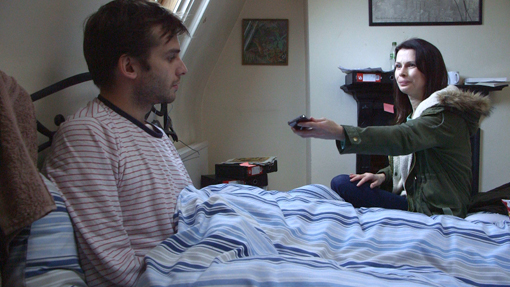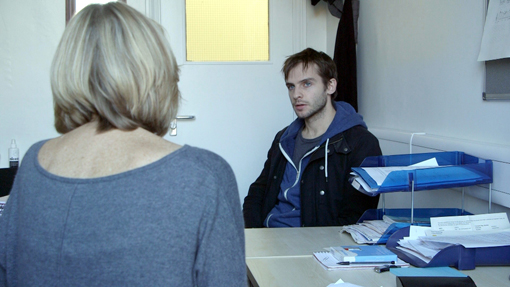Stephen Engelhard is the founder of Angel Productions, and produces and directs its videos for universities. He explains how The PhD Survival Video was produced.
 About the author: Stephen Engelhard has a postgraduate diploma in journalism studies, and worked as a researcher, producer and director in broadcast television for many years (ITV and Channel 4). He started Angel Productions to apply his experience to training and education. Since 2007 his main project has been a continuing series of videos to support the training of doctoral students, now used in more than 70 UK institutions.
About the author: Stephen Engelhard has a postgraduate diploma in journalism studies, and worked as a researcher, producer and director in broadcast television for many years (ITV and Channel 4). He started Angel Productions to apply his experience to training and education. Since 2007 his main project has been a continuing series of videos to support the training of doctoral students, now used in more than 70 UK institutions.
‘Don't you know that nobody's attention span for videos is longer than three minutes?’ ’How can a mere half hour video do justice to a subject like the mental health of PhD students?’ ’If you present such a bleak view, your video will just frighten people off from starting a PhD.’ ’There's no point in a video on this subject unless it shows how people are struggling.’
One of the joys of producing training videos is being showered with well-intentioned, contradictory advice. To navigate through such contradictions, the producer has to fall back on experience. When we made The PhD Survival Video it was to be the eighth video in a series we make for universities, so there were plenty of lessons to be learned from the back catalogue.
… we sought to address the epidemic of stress, isolation, emotional and mental health problems being reported in HE
People with the concentration span to devote at least four years to a PhD can certainly be persuaded to watch half-hour videos - if the content addresses their concerns and is well presented. A short video is never enough to solve weighty problems, but can motivate and inform its audience and signpost sources of help for further action. As for putting off students by presenting a bleak view of doctoral study, we did have a balance to strike.
The video would only be seen, and paid for, if universities wanted to buy it for their staff and students, so we were not in the business of frightening students off. But we were seeking to address a serious issue: the epidemic of stress, isolation, emotional and mental health problems being reported in higher education. And universities, of course, are as concerned as anyone else, for the welfare of researchers and the completion of PhDs.
The subject came up as a candidate for video treatment through the Guardian Higher Education Network. A blog published there by an 'Anonymous Academic' in March 2014 describing a 'culture of acceptance' of mental health problems for research students, attracted record numbers of comments and clearly struck a chord. The previous videos in our series had mainly focused on the practical and academic skills for undertaking a research degree, but clearly there was a story to be told about the emotional journey as well, and this was the time to tell it.

One editorial problem was whether we would be making a video that seemed to bite the hands that feed us. We talked to researchers who had suffered mentally and emotionally through their PhDs, and failures by universities to provide good supervision often turned out to be at the heart of the problem. Could we make the video without it seeming like an attack on supervisors and institutions?
The answer we found was based on combining drama scenes with factual interviews. Most of our previous videos use a similar mixture of content, so this fitted well. We could use drama to create engaging characters our viewers would empathise with (for rather more than three minutes). The story could highlight the problems we were hearing about from universities without naming names and blaming individuals. We could choose real people to interview, more about the impact of their experiences than to give blow-by-blow accounts. The two elements would reinforce each other.
This was not to let universities off the hook. Our drama scenes portray supervisors acting with less than perfect sensitivity, and one scene specifically debates what the supervisor's responsibilities should or shouldn't be when students are struggling. The point was to make a video, which supervisors as well as students could discuss and learn from, and not feel under attack.

The production process started with a planning meeting between myself, scriptwriter Mark Holloway, Professor Sasha Roseneil (who was interested in the topic as a psychotherapist as well as being the director of Birkbeck's Institute for Social Research) and John Wakeford, the editorial consultant to the video series. John is sometimes described as the 'Professor of PhDs': he knows universities inside out through his work as director of the Missenden Centre, advising on researcher development all around the UK. Between us we reviewed what we knew about the topic, what we felt a video could achieve, and how drama scenes could contribute to it. We sent Mark away with a brief to draft some scenes for us to discuss, and I was to hunt down appropriate 'real' people to be interviewed.
There was also the small matter of money, without which films and videos cannot be made. Universities had funded most of the previous videos in the series. This time John Wakeford offered to invest funds from the Missenden Centre: his dealings with research students and supervisors had convinced him that this video was much needed, and that universities would buy it.
As we looked for participants, the Guardian's 'Anonymous Academic' who had started the public discussion, 'came out' as Nicola Rolfe, who had recently completed a physics PhD, and she agreed to be one of our interviewees. Meanwhile, Mark Holloway had interpreted his brief and come up with a script about Simon, a new PhD student whose optimism quickly gives way to anxiety and depression when he realises what a difficult subject he has taken on, how little direction he can expect from his supervisor, and how the challenges of life, money and relationships cannot be avoided. Simon struggles on, refusing to seek help until his friend Rachel, a more experienced PhD student (who has featured in a number of the other videos) presses a phone into his hand and insists that he makes that call to the counselling service.
We needed locations for shooting our drama scenes, including a working university library for some of the scenes where Simon and Rachel run into each other. We wanted real library activity in the background for authenticity, but what university would let us risk disturbing users? In the end we found a willing library, and the users disturbed us more than we disturbed them, with sudden surges of people through noisy doors, uncannily timed whenever we started shooting a scene by the entrance. As always, video production is a mixture of high thoughts and banal practicalities.
The PhD Survival Video was completed in time for the spring term, and in March Birkbeck kindly hosted a screening and discussion by way of a formal launch. This was a rare opportunity for me, as the producer, to see an audience responding to one of our videos: all too often we send them out to universities and hear no more unless we beg for crumbs of feedback. The room was packed, mainly with PhD students from Birkbeck and elsewhere. There were some tears and many nods of recognition as the story of Simon’s descent into depression unfolded. There was laughter at the occasional touches of humour in the script. And there were many comments and questions at the end. One student emailed her appreciation afterwards, saying ‘It was really refreshing to hear the emotional aspects being articulated and although I did not know anyone there, I felt very much part of a nascent community.’ The video is now in use in a growing number of UK universities, and I hope it is helping doctoral students to feel connected to a community.
Stephen Engelhard